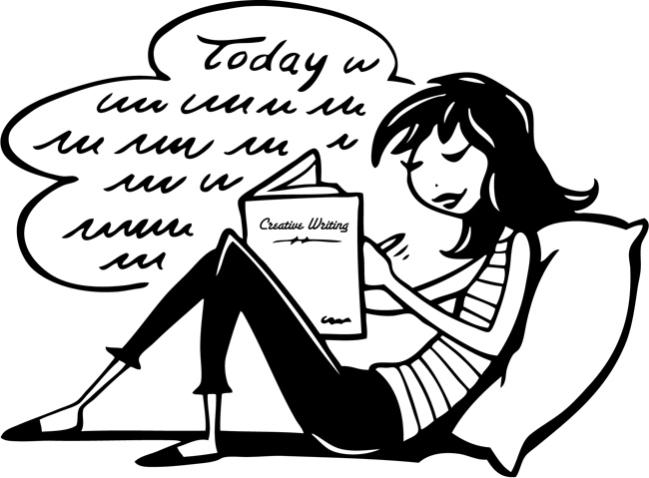

Writers House Outreach Coordinator, Allyson Even, leads writing program for h.s. kids
Philadelphia Weekly
November 2, 2010

At a table in the library of West Philadelphia Catholic High School, about a dozen seniors have their attention focused on Alex Zimmer, a Penn student who is presenting his favorite creative-writing exercise: Describe a scene first from the perspective of someone who has just received great news, and then describe the same scene from the perspective of someone who has just received bad news.
The kids are there for WriteCorp, an after-school creative-writing club created by Zimmer and fellow Penn student Allyson Even.
Last year, Even, a Latin American Latino Studies and Africana Studies major and a Creative Writing and Urban Education minor (yes, two majors and two minors), was hired as a work-study student to revive community outreach at Penn's Kelly Writers House. The afternoon at West Philadelphia Catholic was just one of the many small-scale initiatives she organized, but the event prompted her to question whether the current outreach offerings at Penn was sufficient.
Currently, the Netter Center for Community Partnerships serves as a hub and sponsors for a comprehensive array of community services. Among these is Community School Student Partnership (CSSP), which recruits and trains Penn students to assist hired staff in mentoring and tutoring at West Philadelphia schools through a series of structured programs. The Kelly Writers House also hosts a series of literary-based outreach programs, including WriteOn!, in which fourth- through eighth-graders from two local schools come to the Writers House on select Fridays and Saturdays to engage with Penn students on extracurricular writing projects.
While Even commends the service done by these and similar groups on campus, she says WriteCorp offers unique benefits. Foremost among these is flexibility. Unlike CSSP, WriteCorp will be more accommodating to an individual teacher's request. "Whether it's enrichment, a fun thing for their kids to do, or whether it's tied to the curriculum and tied to Pa. standards—one thing that's really important about the model of WriteCorp is being able to adhere to what a teacher wants."
WriteOn!, which requires kids to commute to Penn's campus during what would otherwise be their free time, is an attractive option for the college volunteers because of accessibility. However, Even expresses concern that this model is "already selecting for students that have the initiative, that have the interest, and that have the parental support to come here." With WriteCorp, members will travel to schools throughout the city and in that way "be reaching students that might otherwise never come into contact with a program like this."
Senior Alex Marcus, has signed up to be one of WriteCorp's tutors. He says that while WriteOn! focuses exclusively on nonacademic writing, WriteCorp will allow him "to learn more about the kind of writing education Philadelphia public school students are getting, and, perhaps, do something to improve it."
This year, WriteCorp will be recruiting members—already up to 25—to establish a training program and to reach out to teachers who might be interested in hosting a workshop. Michelle Taransky, a professor in the Critical Writing Department at Penn and a staff member at the Kelly Writers House, joined WriteCorp as the faculty advisor early this fall. Taransky has been involved in poetry outreach since her junior year at the University of Chicago. Most recently she ran a poets-in-the-schools program, Hands On Stanzas, for the poetry center of Chicago.
By the spring, Even hopes to have several regular workshops in session. Each workshop will likely follow a general pattern of introducing the students to a paradigm piece of sample writing and then encouraging them to craft their own work based on the style exemplified. Even explains the benefits of this interactive style, saying, "I think a lot of times we lose sight that kids are not just like containers to be filled with information and a lot of times in school we're just trying to shove stuff down kids throats and have them memorize and have them regurgitate rather than having them create. And I think it's a higher level of intelligence to synthesize and create something of your own that's unique."
Students will then have the opportunity to display their writing from these workshops on the Writers House online literary magazine, The Blacktop. Even says that posting their work where other kids can read it is integral to WriteCorp's mission.
"Writing is an incredible way to empower kids," says Even. To really say ‘hey, what you have to say matters and probably there are a lot of people in your life telling you that it doesn't but we think it's valuable that you put what you have to say on paper.'"
But it's not all charity. "We want to stress this idea of horizontal community service versus vertical community service," says Even. "Vertical community service is like ‘I'm going into this underprivileged area and I know a lot and I'm going to share it with these people. I'm giving to these people.' Horizontal community service is, ‘I have things to learn from the people I'm going to work with. I have things to offer and they have things to offer.'" Even says this is one of the fundamental tenets that distinguishes WriteCorp from other programs.
WriteCorp provides the kids with valuable lessons that Even anticipates will be applicable in any field as well as the chance to be heard.
And what do the Penn undergraduates stand to gain?
Perspective. "I mean, we're all really bright but just because you're really bright doesn't mean you're any better than anyone else," says Even. "And it also doesn't mean you know a whole lot about the world beyond 42nd Street."